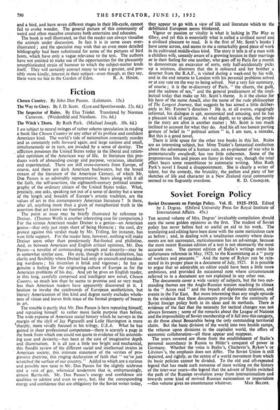Soviet Foreign Policy
Ttia second volume of Mrs. Degras' invaluable compilation should earn the same golden opinions as the first. The student of Soviet policy has never before had so useful an aid to his work. The translating and editing have been done with the same meticulous care as before ; and, in dealing with a totalitarian country where docu- ments are not sacrosanct, meticulousness has an advantage, because the most recent Russian edition of a text is not nbcessarily the most accurate one. The current edition of Stalin's writings omits his unfortunate reference in May, 1925, to the Kuomintang as a' party of Workers and peasants." And the name of Rykov can be rein- stated in its proper place in a document of July, 1927. It is possible to argue that so admirable an editor could have been a little more ambitious, and provided In occasional note where circumstances referred to in a document are not explained in any other one.
The documents cover a wide variety of subjects, but the two out- standing themes are the Anglo-Russian tension reaching its climax in the " Arcos raid" and the breach of diplomatic relations, and events in the Far East. But more interesting than any single episode is the evidence that these documents provide for the continuity of Soviet foreign policy both in its ideas and its methods. There is evidence of the fact that the necessity for tactical changes was not always foreseen ; some of the remarks about the League of Nations and the impossibility of Soviet membership of it fall into this category, as do those about Bessarabia being the only outstanding territorial claim. But the basic division of the world into two hostile camps, the reliance upon divisions in the capitalist world, the offers of economic collaboration—all these appear and reappear. .
The years covered are those from the establishment of Stalin's personal ascendancy in Russia to Hitler's conquest of power in Germany. Whether the voice is Stalin's, Chicherin's, Rykov's or Litvinov's, the emphasis does not differ. The Soviet Union is still depicted, and rightly, as the centre of a world movement from which its basic policies cannot be divided. To the old and oft-repeated legend that has made such nonsense of most writing on the history of the inter-war years—the legend that the advent of Stalin switched the path of the Russian revolution away from internationalism and towards some kind of revived Russian nationalism or imperialism —this volume gives no countenance whatever. MAX BELOFF.


































 Previous page
Previous page